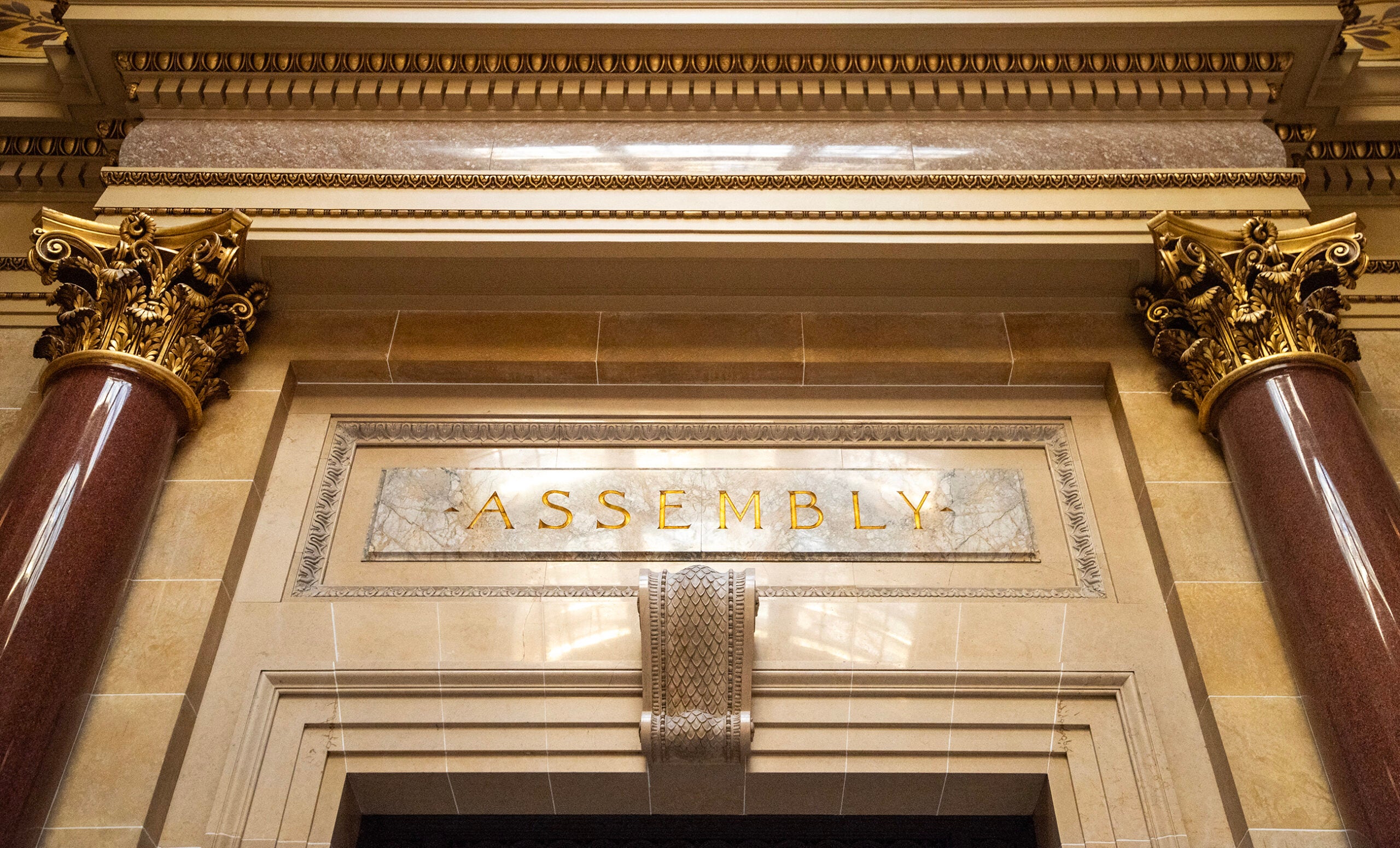The state would exempt rent-to-own stores from Wisconsin’s Consumer Act under a bill approved Tuesday evening by the state Assembly.
The proposal has resurfaced and failed several times over the past two decades, but it’s one of many bills getting an end-of-session push as lawmakers look to wrap up their business for 2018.
It passed with a vote of 59-35, with Rep. Andre Jacque, R-De Pere, joining Democrats in voting against the bill.
News with a little more humanity
WPR’s “Wisconsin Today” newsletter keeps you connected to the state you love without feeling overwhelmed. No paywall. No agenda. No corporate filter.
The Assembly also took up a number of other bills Tuesday, including a proposal to allow small businesses to “self-fund” employee health insurance plans and a prominent piece of Gov. Scott Walker’s legislative agenda aimed at stabilizing insurance premiums in Wisconsin.
Here’s a breakdown of some of Tuesday’s highlights:
Rent-To-Own Regulation
The latest bill to deregulate rent-to-own stores in Wisconsin is slightly different than those introduced in past legislative sessions, but like its predecessors, it’s being pushed by the rent-to-own industry.
Rent-to-own stores let customers make rental payments on products like televisions or washing machines with an option to eventually purchase them. This can lead to interest charges of more than 200 percent.
While rent-to-own stores exist in Wisconsin, they operate in much greater numbers in other states, where the laws are more relaxed.
Supporters of the bill say it balances the needs of businesses and consumers.
“This just ensures that we do a better job of ensuring that everybody knows exactly what’s in the transaction and people are protected, but they’re also given the ability to make choices for themselves,” said Assembly Speaker Robin Vos, R-Rochester, before the vote.
Right now, rent-to-own companies have to publicize their interest rates. Under the bill, they’d no longer have to.
A coalition of consumer groups and religious organizations opposes the bill, arguing the change would open the door to predatory practices that make it harder for people in need to make ends meet.
“The only people pushing for this are the special interests,” said Assembly Minority Leader Gordon Hintz, D-Oshkosh, during debate. “The bottom line is this is a predatory industry.”
‘Self-Funding’ Insurance Option For Small Businesses
The Assembly approved a proposal Tuesday evening that would allow small businesses to band together to offer a new type of insurance plan to employees.
Under the bill, businesses could pool their money to “self-fund” employee health benefits.
The measure passed with a vote of 59-36, with Rep. Treig Pronschinske, R-Mondovi, joining Democrats in voting against it. The bill now moves to the state Senate.
Rep. Deb Kolste, D-Janesville, argued the change would cause premiums to rise for people who buy insurance on the Affordable Care Act marketplace.
“It’s maybe going to give some premium relief to some people, but it’s going to be detrimental to a lot of people,” Kolste said.
The proposal’s sponsor, Rep. Shannon Zimmerman, R-River Falls, said the measure is aimed at making providing insurance coverage more affordable for small businesses.
“We’re going to help small businesses help those employees that they want to be able to provide health care coverage to in the state of Wisconsin,” Zimmerman said.
Democrats expressed concern last week that the bill wouldn’t require employer plans to cover certain medical procedures.
Zimmerman introduced an amendment to the bill to include more state-mandated coverage.
Increasing Criminal Penalties
Three bills that would stiffen criminal penalties for certain crimes are also on the Assembly’s agenda, although Assembly Speaker Robin Vos, R-Rochester, said they would likely be debated and passed Wednesday.
One proposal would impose a mandatory minimum sentence for felony murder or second-degree intentional homicide if the person has been previously convicted of other certain crimes, including felony murder or second-degree intentional homicide.
Under the bill, the minimum sentence for that crime, and a series of other crimes, including homicide by intoxicated use of a vehicle or firearm, would increase from three and a half years to five years.
If passed, that bill would go to Gov. Scott Walker’s desk for his signature.
Another bill would impose a minimum prison sentence of three years for individuals who illegally possess a firearm and were previous convicted of a certain crime, including a violent felony.
That proposal would also go to the governor, if passed.
A final bill would increase criminal penalties for carjacking. It would also move to the governor’s desk.
Walker Agenda
Assembly lawmakers on Tuesday also approved key pieces of Walker’s 2018 legislative agenda.
Those include a plan that would pay private insurers government funds to help cover the cost of their most expensive patients.
The Assembly is expected to take up a reorganization of the state’s juvenile justice system, which includes the closure of the embattled Lincoln Hills and Copper Lake juvenile corrections facilities, on Wednesday, according to Assembly Speaker Robin Vos, R-Rochester.
Other Action:
Assembly lawmakers on Tuesday also passed bills that would:
change the requirements for the makeup of the Milwaukee Police and Fire Commission. The measure passed on a vote of 59-35. The bill will also need to be approved by the Senate.
allow the use of electronic voting machines for early voting in Wisconsin. The bill passed on a voice vote. The bill will also need to be approved by the Senate.
bar individuals under 18 from buying a drug containing dextromethorphan, a common ingredient in over-the-counter cough medicine, without a prescription.The bill passed on a voice vote. It will also need to be approved by the Senate.
raise the limit on the amount of tax credits that may be certified by the Wisconsin Economic Development Corp. under the historic rehabilitation tax credit from $500,000 to $3.5 million. The bill passed with a unanimous vote. It also passed the Senate on Tuesday, so it now moves to Gov. Scott Walker for his signature.
create a lifetime fishing license in Wisconsin. The bill passed on a voice vote. The bill will also need to be approved by the Senate.
Editor’s Note: This story was last updated at 11:40 p.m. Feb. 20, 2018.
Wisconsin Public Radio, © Copyright 2025, Board of Regents of the University of Wisconsin System and Wisconsin Educational Communications Board.







